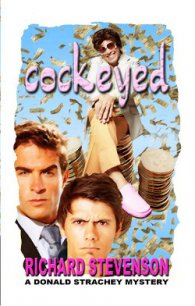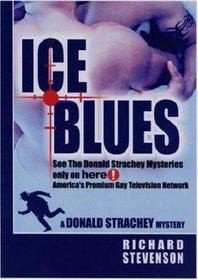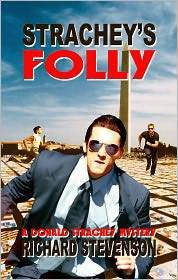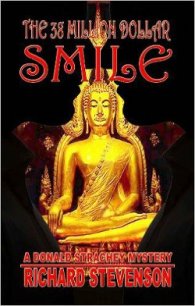A Shock to the System - Stevenson Richard (читать книги онлайн без регистрации TXT) 📗
"What type of note was that?"
"Not handwritten. The 'note' was on Paul's computer. It said, 'I love you, Larry. I'm sorry. Paul.' Any fool can see that Bierly put it there himself, the goddamn conniving little homicidal piece of shit."
"He could have," I said. "But what makes you so sure he did, Phyllis? What evidence have you got beyond Larry's financial problems and the fact that you don't happen to like him? This is awfully thin stuff you're presenting me with—a combination of resentful-mother-in-law-ism and vague circumstantiality. It's not much to start out with, and probably grossly unfair to Larry Bierly."
She gazed at me levelly and said, "That's what the police thought too. But there is something about Larry Bierly that you ought to know, Don. Just because it's not on the official record, the police pooh-poohed it. But I've got the lowdown on Mr. Larry Bierly. I got it from Paul. Larry Bierly is a violent man. He once assaulted a man and threatened to kill him. This was all recorded on tape, but the man didn't press charges because Paul bought him off."
She watched me with cool expectancy. I said, "Who was this man?"
"Vernon Crockwell."
"Vernon Crockwell, the psychologist?"
"That's the man."
I said, "Even if Bierly had carried out his threat and murdered Crockwell, a lot of people in Albany would have considered it justifiable homicide."
Phyllis Haig neither laughed nor exclaimed over this. She just opened her bag and confidently pulled out her checkbook.
2
Back on Central, I phoned Larry Bierly at Whisk 'n' Apron and set up an appointment, then reached Timothy Callahan at his office at the legislature.
"You knew Paul Haig, didn't you?"
"Slightly—why?"
"Did he strike you as depressed?"
"Well, he killed himself."
"Other than that. Just what you saw."
"More anxious than depressed, I'd say. But I hardly knew him, so I'm not the best person to come to for an insightful diagnosis of his mental state. Why do you ask?"
"I'm coming to that. It's problematical. Was Haig the guy we'd see sometimes with his boyfriend at gay political events—him a tall blond with wavy hair and the boyfriend darker and chunkier? And they were always a little shy and nervous and apart from everybody else?"
"That's them. Larry something was the boyfriend."
"Larry Bierly."
"I tried to get them more involved, or at least to feel more at ease. And they were perfectly nice, and friendly, but they never seemed able to mix and get to know people and really relax."
"You're ever the thoughtful host, Timothy, whether it's brunch for twenty-two or an assault on the Senate Republicans."
"Thank you."
"They both must have friends in Albany. Any idea who?"
"Yes, but it would be easier to answer these questions if I
understood the context in which they were being asked. What's this all about?"
After nineteen years, he still needed explanations from me. If being willing to speak at length into an unresponsive void isn't one of the cornerstones of a rich relationship and enduring love, what is?
I said, "I'll get to the point, trust me. Just tell me what you know about Haig's and Bierly's social life, if any. Don't think context. Pretend we're deconstructionists."
He let out a little sigh that was so recognizable I could almost smell the tuna he'd had for lunch. He said, "Both Bierly and Haig owned and managed businesses out at Millpond. But you already knew that, right? We've seen them out there."
"Right. Bierly runs Whisk 'n' Apron and Haig owned Beautiful Thingies."
"Well," he said, "I have seen Paul Haig somewhere else."
"Where?"
A little tuna-scented silence. "You're going to consider this somewhat pompous," he said.
"Uh-huh."
"I'm not sure of the ethics of my telling you where I saw Haig."
"Oh, the ethics."
"I'm afraid so."
Now Timmy was neither a psychiatrist nor an attorney. Nor was he a priest—although at fourteen he had briefly entertained the idea of becoming one, in which calling he would have been able to wage holy war on his newly discovered unholy sexuality while at the same time dressing and undressing with men. By fifteen, though, he had discovered both liberation theology and Skeeter McCaslin, with whom he enjoyed a sweaty, Clearasil-slick affair for over two years—until they both had graduated from high school and left Poughkeepsie—that was carried out with the stealth of Mossad's operation in getting Adolf Eichmann back to Israel. I once asked Timmy if "Skeeter" was short for "Mosquito"; he just laughed and said most assuredly not.
I said, "Let me guess why you have ethical doubts about telling
me where you saw Paul Haig. Does it have something to do with covert U.S. government activities for dealing with North Korea's nuclear-bomb program?"
He laughed lightly. "I knew you'd see my reaction as kind of— morally overweening."
"Your term, not mine."
"The thing is, if I told you why I'm reluctant to tell where I saw Haig, you'd understand my point. But then you'd also know where I saw him, and I'm the one who would have told you. Can't you just take my word for it that I shouldn't tell you where I saw him? Trust me. Like I'm trusting you."
I said, "Paul Haig's mother is convinced Larry Bierly killed Haig and made it look like suicide. Haig and Bierly were on the outs, she says. Bierly was the beneficiary of Haig's estate and needed money to save his business, according to Mrs. Haig. She told me Bierly has a history of violence and once assaulted and threatened to kill a man. Mrs. Haig wants to hire me to prove the coroner was wrong and the suicide was murder and have Bierly charged. The mother is something of a horror show herself, and I'm trying to evaluate whether or not to hire myself out to her. That's why I'm asking you these questions, Timothy. Now are you going to help me out?"
"AA," Timmy said.
"As in Alcoholics Anonymous?"
"That's where I've seen Haig—with the AA bunch that hangs out on the sidewalk in front of Saint Aggie's before their meetings."
"More than once? He was a regular at that meeting?"
"I'd say off and on over several years. When I worked late and walked home in warm weather, I'd sometimes pass there while they were out smoking and drinking coffee on the sidewalk before the eight o'clock meeting. Sometimes I'd say hello to Haig and he'd say hi back."
"What about Bierly? Was he ever there too?"
"Not that I ever saw. I just saw Paul Haig."
I said, "Timmy, I don't think it's unethical for you to pass this
on to me. AA members are morally bound to protect the privacy of other members. But you're not a member. Anyway, you're telling me, not Le Monde. So what's the big deal?"
"I'm not a member, but I respect AA's confidentiality ethic, and the best way I can show my respect for that ethic is by observing it."
"So by walking past their meeting you fall within AA's ethical penumbra?"
"Yes, I believe I do."
Now it was he who must have gotten a whiff of my gnocchi breath. I said, "Then I appreciate your ethical lapse on my behalf."
"You're welcome to it this one time. It's no big deal. Do you really think Bierly might have killed Haig? I thought Haig died of a drug overdose."




